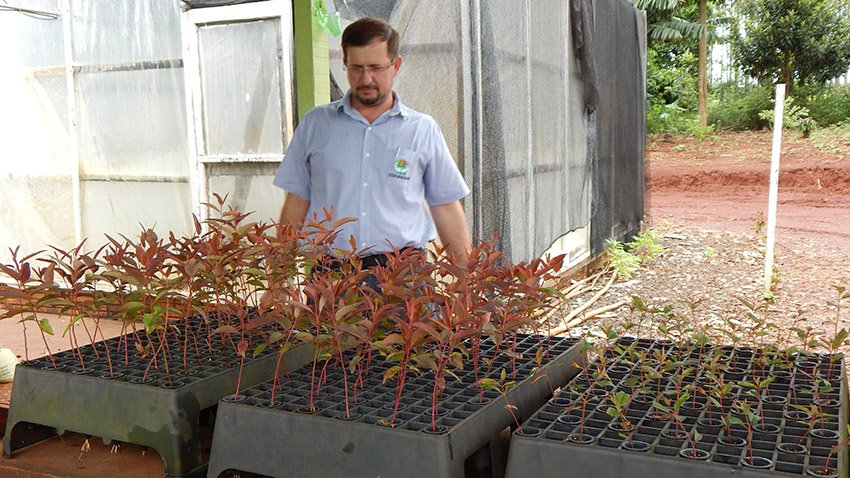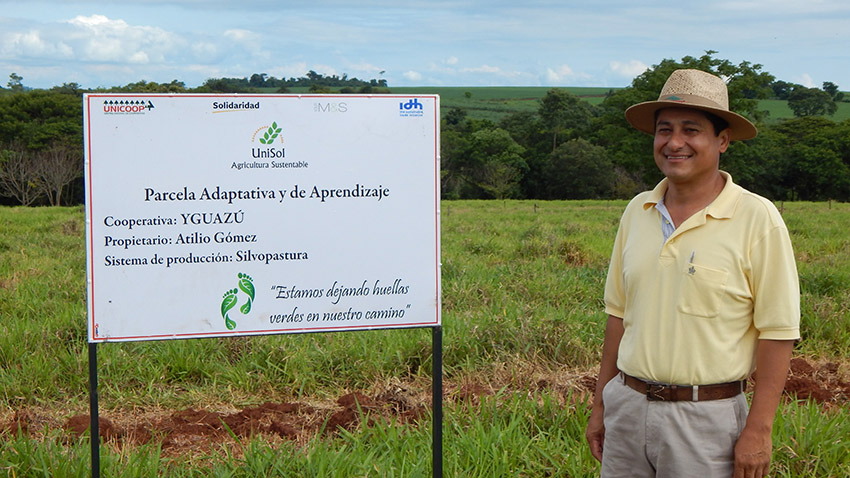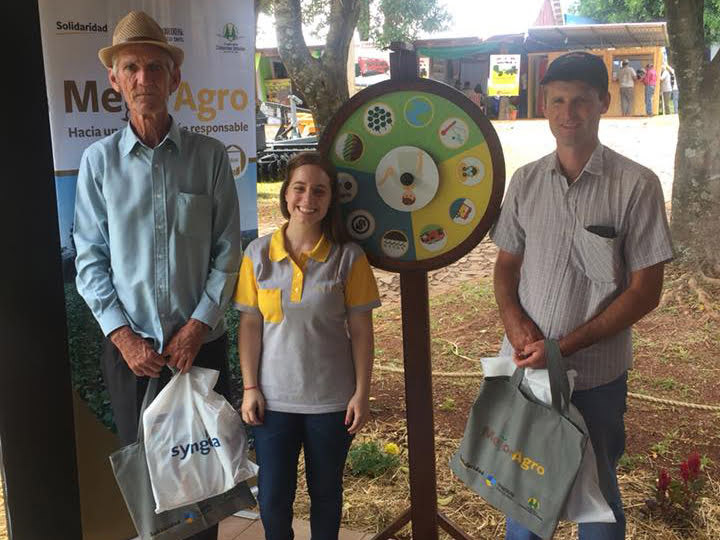 Tree nursery at Coopasam cooperative
Tree nursery at Coopasam cooperative
Cooperative-led sustainable agriculture
The UniSol project was born from a partnership between UniCoop – an umbrella farmer association that assembles eight cooperatives in Eastern Paraguay – and Solidaridad, with support from IDH and Marks & Spencer. UniSol developed a sustainable agriculture model focused on increasing farmers’ productivity while complying with labour and environmental laws for the conservation of the Atlantic Forest.
The three-year project, which ran from 2014-16, provided 80 training sessions to 2,658 producers and 100 extension technicians in topics including:
- soil management to prevent erosion and improve fertility
- integrated crop management to correctly use agrochemicals
- environmental adaptation
- forestry development.
Through field days and demonstration units, producers witnessed the benefits of sustainable management and adjusted their practices. This led to the responsible management of over 190,000 hectares of land, and the production of 611,000 tons of soy, by the end of the project.
At an environmental level, the project’s greatest achievement was the awareness created among the cooperatives and their members about the importance of environmental conservation, and how to develop profitable and sustainable forestry activity.
This achievement was possible thanks to the creation of an environmental committee, with the participation of the leaders of each of the eight cooperatives. Under their lead, each cooperative provided the necessary staff and resources to install forest-environmental departments.
UniSol’s environmental committee achieved what the National Environmental Committee had not achieved in five years thanks to the cooperatives’ commitment and the fact that its creation was agreed upon, instead of forced.
– Raquel Cáceres, leader of UniSol’s environmental-forestry component
The cooperatives’ technical staff shared information about how to comply with environmental legislation. For example, how to conserve springs and protect watercourses. They also created nurseries for native seedlings and eucalyptus for reforestation.
 Silvo-pastoral demonstration plot at Yguazú cooperative
Silvo-pastoral demonstration plot at Yguazú cooperative
Under this model, the project:
- reforested 397 hectares with 29,345 native trees
- trained 282 partners in environmental adaptation
- set 30 plots to create an information network on the performance of different models of commercial reforestation for logging, firewood and silvo-pastoral production.
Replicability potential
Proof of UniSol’s sustainability and replicability is that the UniCoop cooperatives’ environmental committee continues to operate over two years since the project’s closure.
Following on from UniSol’s success, Solidaridad formed a continual improvement model that can be applied among soy suppliers of the main traders present in Paraguay. This model is based on the use of digital solutions to enable producers to self-evaluate and formulate recommendations for the adoption of best practices.
Between 2016 and 2017, Solidaridad ran a project called Sustenagro. This project, in alliance with ADM and IDH, encouraged the adoption of good practices in the field. In addition, it worked with communities living around ADM silo plants and farms, to create supply areas free of social and environmental risk. Through the project, 175 producers were trained with the potential to produce 533,100 metric tons of soybeans, grown on 132,678 hectares of land managed under best practices.
 A quiz game to identify good productive, social and environmental practices at the biggest agri-fair in Paraguay, Agrodinámica
A quiz game to identify good productive, social and environmental practices at the biggest agri-fair in Paraguay, Agrodinámica
Another example is MejorAgro, an alliance with COFCO and Colonias Unidas Cooperative. The project, still active, has so far achieved 6,100 hectares and 21,513 tons of soy produced under responsible management according to Roundtable on Responsible Soy Association standards. The project has started a ripple effect within the cooperative members and, though originally only targeting 100 farmers, almost 700 new producers have joined the training sessions.
Finally, a new partnership with Cargill will start the implementation of the Triple S standard (sustainably sourced and supplied) among producers within its supply chain.
The Energy Globe Award
The Energy Globe Award was created in 1999, and is today one of the most prestigious environmental awards in the world. The objective of the prize is to highlight outstanding projects for sustainable best practices, which are possible to replicate, to deal with current environmental challenges.
Annually, Energy Globe receives entries from around 800 projects and initiatives from 187 countries. UniSol received Paraguay’s national prize, chosen from eight national candidates. It now competes for the international prize, which will be announced in November.
Read more about Solidaridad South America's programmes
